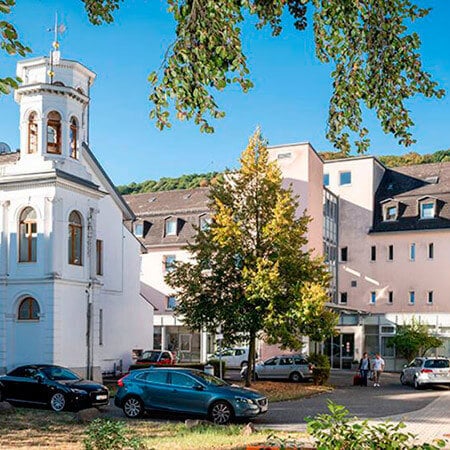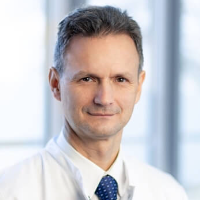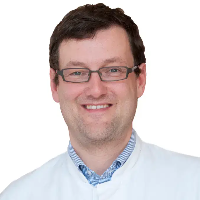Radiotherapy for Brain Astrocytoma treatment in the Best Hospitals in the World
Treatment prices are regulated by national law of the corresponding countries, but can also include additional hospital coefficients. In order to receive the individual cost calculation, please send us the request and medical records.

Department of Radiation Therapy and Radiation Oncology
The Department of Radiation Therapy and Radiation Oncology offers all types of modern radiation therapy for the highly effective treatment of benign and malignant tumors. The department is equipped with three linear accelerators and brachytherapy systems, which provide patients with the safest, most effective, and most sparing irradiation of tissues affected by oncopathology. The department also provides radiotherapy planning and radiosurgery. An ultramodern technical base, exceptional professionalism, and experience of the department's physicians are the cornerstones of successful clinical practice.





Department of Radiation Therapy
According to the Focus magazine, the University Hospital of Ludwig Maximilian University of Munich is regularly ranked among the best medical institutions in Germany! The hospital is the largest multidisciplinary medical facility, as well as a leading research and training center in Germany and Europe. The hospital is proud of its bicentenary history and tirelessly confirms its primacy at the national and international levels. The outstanding quality of medical care is complemented by highly productive research activities, thanks to which many effective diagnostic and therapeutic methods, saving people’s lives, have been presented in medical practice.







Department of Radiation Therapy
According to the Focus magazine, the Department of Radiation Therapy ranks among the top German medical facilities in the area of its specialization! The department offers all types of modern radiation therapy for cancer treatment at the highest level of university medicine. The priorities of the department's work include the treatment of tumors of the gastrointestinal tract, urogenital system in men, gynecological tumors in women, oncopathologies of the nervous system, as well as head and neck tumors. Each department's specialist strives to ensure all the patients with the most effective and at the same time customized treatment. Due attention is also paid to radiation protection.





Astrocytomas are one of the most widespread primary central nervous system tumors. Surgery, radiation therapy, and chemotherapy are used to treat them. Both benign and malignant astrocytomas are found in the brain. Beyond all doubt, different types of astrocytoma require different approaches to treatment and different treatment schemes. The highest effectiveness and the lowest rate of neurological deficits and disability are demonstrated in undergoing radiation therapy abroad, with the best doctors in the world, using modern equipment.
When is radiation therapy required?
It should be noted that not all astrocytomas require radiation therapy. Sometimes surgery alone is enough to cure a disease completely.
Radiation therapy may be used as an alternative to surgery. It may also be used after surgery, for relapse prevention. Radiation therapy is often combined with chemotherapy.
The goals of radiotherapy depend on the clinical situation and may include:
- Destruction of the tumor
- Prevention of relapse, making the relapse-free period longer, increasing the survival after surgery
Reducing clinical manifestations of the disease, improving the quality and life expectancy of patients with advanced astrocytoma
Radiation therapy after surgery
Not all patients require a course of radiation therapy after the surgical removal of the brain astrocytoma. After removing the tumor, doctors send it for histological examination, including the molecular analysis. The laboratory determines the histological type of astrocytoma, as well as the presence of mutations in its genes. If the risk of recurrence is low, then additional treatment is not required.
Radiation therapy, which is often combined with chemotherapy, is administered in the following cases:
- High grade astrocytomas
- Non-radical removal of low-grade astrocytomas
If possible, surgery for astrocytoma should be radical. Nevertheless, in a number of cases extensive surgery is associated with the risk of neurological complications. Some of the health consequences are severe and irreversible. They reduce the patient's quality of life significantly. Therefore, doctors do not remove the tumor completely if this could damage vitally important areas of the central nervous system.
With partial removal, the even benign astrocytomas can recur. There are also cases when the tumor becomes intermediate or malignant some time after the surgery. To prevent relapse, a course of radiation therapy and chemotherapy is performed. The remains of the tumor are destroyed by radiation. If the procedure is successful, the disease can be cured completely.
Radiation therapy is not performed immediately after the surgery, as it is unsafe for a patient. It takes several weeks for surgical wounds to heal. Only when the patient recovers fully, a course of irradiation is carried out. If chemotherapy is required, then it is administered simultaneously. Clinical studies demonstrate that in malignant astrocytomas addition of chemotherapy to radiation therapy increases the relapse-free period and life expectancy of patients.
Replacing surgery with radiation therapy
Stereotactic radiotherapy or stereotactic radiosurgery are methods that can be used instead of surgery to destroy small astrocytomas. They are used if a tumor diameter is up to 3.5 cm.
The main advantages of radiation therapy over surgery:
- Lower health risks
- Better treatment tolerance, absence of pain or discomfort
- Short hospital stay and fast recovery after the surgery
- Irradiation of neoplasms of any localization is possible, including astrocytomas, which are difficult to reach during a conventional surgery
Nevertheless, there are several disadvantages as well. Spheres of radiation therapy application are limited. It can only destroy small astrocytomas. For large tumors, radical radiation therapy is not performed, as it leads to the formation of too large necrosis (dead tissue) zones in the brain. Serious symptoms and complications occur, and some of them may even require additional surgery.
Clinical results after the radiation therapy are not achieved immediately. They can be assessed only in a few months. Accordingly, neurological symptoms regress slowly. After the surgery, they go away much faster – in the early postoperative period.
Key situations when the radiation therapy is used to treat brain cancer without surgery are as follows.
- The initial stage of cancer. If the tumor is small, the cancer can be cured without surgery. Many patients do not want to risk their health, recover from surgery, so they prefer to undergo a course of radiation.
- Cancer in the hard-to-reach region. Some astrocytomas arise deep inside the brain, in an inconvenient for the removal place, or are located near functionally important areas of the brain. Removal of such tumors is associated with the risk of neurological complications development. For these patients, radiation therapy with chemotherapy is the best treatment option.
- Advanced brain cancer. If a surgical operation is no longer recommended, since there is no chance of curing the disease, then palliative radiation therapy is performed. It helps to slow down the development of cancer for some time and reduces the symptoms of the disease.
- Recurrence of brain cancer. Some patients have relapses of astrocytoma after its surgical removal or radiation therapy. In this case, different treatment options are possible. The repeated operation is sometimes performed. However, radiation therapy is often used instead, as it is a more sparing method that gives comparable clinical results. Nevertheless, radiation therapy shouldn’t be performed too often. It is not prescribed before 8 months since the previous procedure have passed. The optimal time period between courses of radiation therapy is one and a half years. In this case, the lowest risk of complications and side effects is achieved.
- Patient refuses to undergo surgery. Regardless of the stage of cancer, some patients are afraid of surgery on the brain and refuse it. In such cases, radiation therapy becomes the main method of treatment, even if it gives the patient less chances of curing the cancer.
Irradiation modes
Three main regimens are used for astrocytoma radiotherapy:
1. The conventional fractionation. This is a long course of therapy that lasts several weeks. The patient receives small doses of radiation continuously. The total dose is divided into approximately 30 fractions.
2. The hypofractionated radiotherapy. In this case, fewer sessions of radiation therapy are required, but higher doses of radiation are used per procedure. Usually from 2 to 7 fractions are used.
3. Radiosurgery. This includes the single exposure to the maximum dose of radiation. The procedure is performed on the advanced models of Cyberknife or Gamma Knife.
Side effects and complications
Radiation therapy leads to good clinical results, but it is often connected with certain side effects. The main ones include:
- Weakness
- Fatigue
- Irritability
- Nausea
- Headache
Some patients experience long-term undesirable effects of treatment. Memory impairment, neurological symptoms, or mental disorders are possible. To avoid complications that are associated with the procedure, it is better to undergo treatment in a good clinic with modern equipment. New radiation therapy methods provide excellent clinical results and spare healthy parts of the brain.
Why is it better to treat astrocytoma abroad?
The latest methods of radiotherapy are used abroad. Well-equipped hospitals provide the healthcare professionals with the best clinical outcomes for astrocytoma treatment with minimal health risks.
Advantages of cancer treatment abroad include:
- Precise diagnostics. Modern equipment for diagnosis making allows doctors to establish the type of tumor, grade of its malignancy, sensitivity to radiation and drugs, growth rate and metabolic activity, etc. Based on results of the examination, doctors make the final diagnosis, assess the risk of disease recurrence and select the most suitable cancer control regimen.
- Modern equipment. The latest linear accelerators and Gamma Knife equipment are used abroad. They allow the healthcare specialists to irradiate the astrocytoma precisely, directing rays into it from different angles. New equipment provides cancer cure with fewer side effects.
- Availability of new treatment options. In the best foreign hospitals, tumor irradiation can be performed without the use of a stereotaxic frame. Thus, the stereotaxic frame does not need to be fixed with screws to the patient's skull, which makes the procedure more convenient and safe. Some hospitals offer proton therapy, which is the safest radiation option used to treat cancer in children.
The cost of treatment of astrocytoma in different countries varies significantly. Those patients who want to receive medical care of the highest level may travel to Germany, Israel, Switzerland, Austria or another country with a developed healthcare system. Prices in Turkey, India, and Thailand are more attractive, but the level of medicine is somewhat worse here. Nevertheless, these countries also have large multidisciplinary hospitals with modern equipment for cancer radiation therapy.
Cancer treatment abroad with Booking Health
To undergo a course of radiation therapy for cancer abroad at an affordable price you may use the Booking Health service. On the Booking Health portal you can find information about foreign hospitals, doctors, medical programs and the cost of treatment. You can compare the cost of treatment in different hospitals to book radiation therapy and chemotherapy at the best price.
Booking Health will arrange a trip abroad for you, including the following services and benefits:
- Choice of the hospital that specializes in the treatment of brain cancer
- Direct communication with the chosen doctor
- Reducing the waiting time for cancer treatment and making an appointment at a convenient date
- Reducing the cost of treatment and diagnosis; prices are lower due to excluding coefficients for foreign patients
- Providing your with the reliable information about your expenses, the cost of the procedures performed, the funds remaining in the account
- Preparation of a medical program without the need to repeat previously performed diagnostic procedures
- Communication with the hospital after radiation and chemotherapy completion
- Purchase and sending of medical products and drugs
- Arranging additional diagnostics or treatment abroad, if necessary
Booking Health specialists provide services of high quality. We will book a hotel and air tickets for you, organize a transfer from the airport to the hospital and back.

